7 signs that you have dust mites in your mattress — and why that's bad for your sleep
Are you sharing your bed with hordes of dust mites? Here’s how to tell, plus how to get rid of them
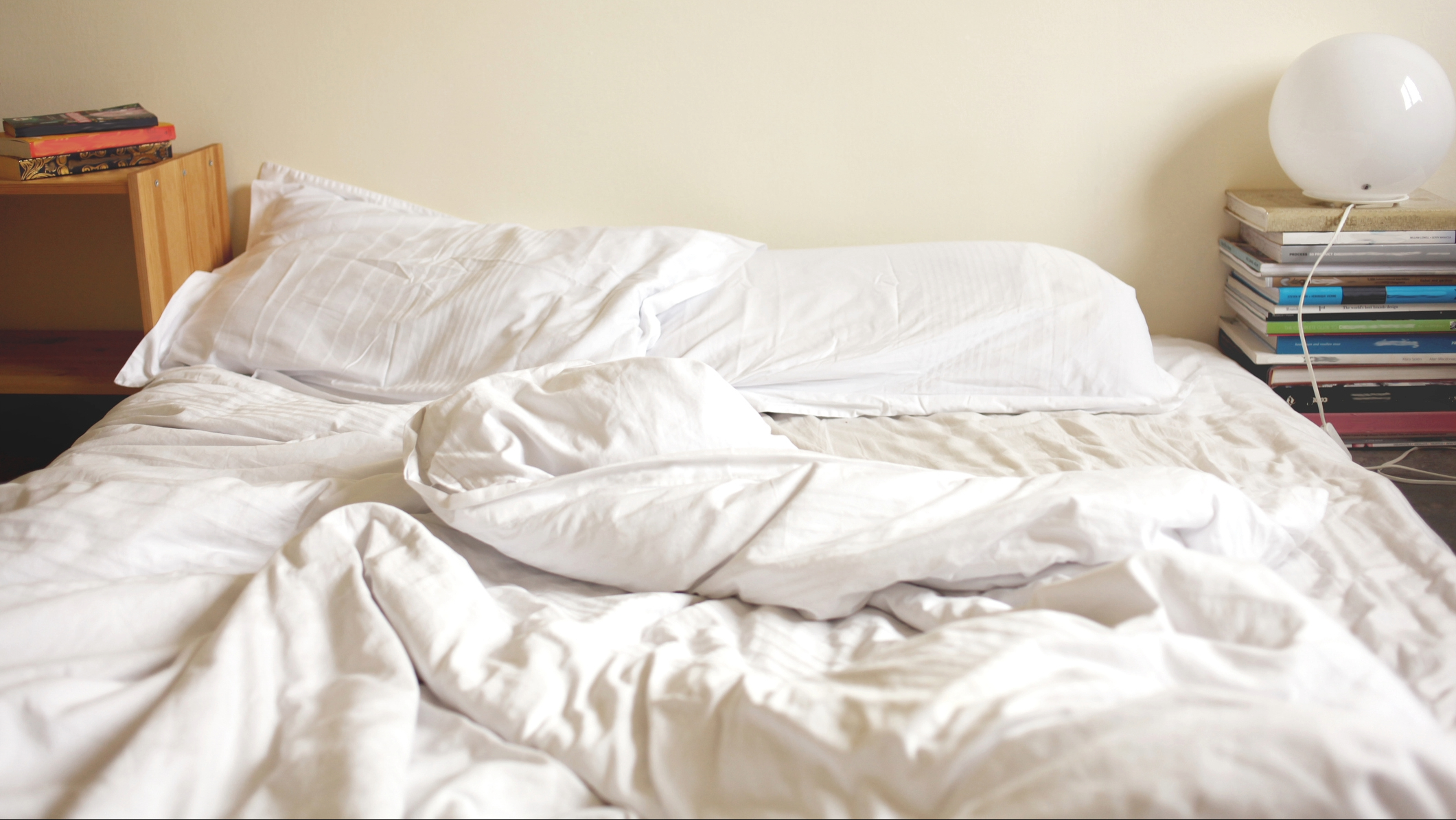
Dust mites are microscopic pests that thrive in warm, humid environments, making your mattress a perfect breeding ground. While they’re too small to be seen by the naked eye, there are certain tell-tale signs that dust mites are lurking in your bed.
Even the best mattresses with the latest in hypoallergenic technologies aren’t immune to their presence. However, if left to freely feed and breed, dust mites can wreak havoc on your sleep quality and overall health.
“If you notice you’re itching uncontrollably despite having no bite marks, it’s more than likely you’re sharing a bed with a horde of dust mites,” says Rebecca Swain, mattress expert at Winstons Beds. “While you can’t see the critters without using a microscope, their presence can be known if you’re suffering from a dry cough in the morning and itchy eyes.”
These tiny critters feed on dead skin cells and can trigger allergies, asthma, and other respiratory issues. From aggravating allergies to disrupting your sleep, these are the seven signs that dust mites have made your mattress their home…
What are dust mites?
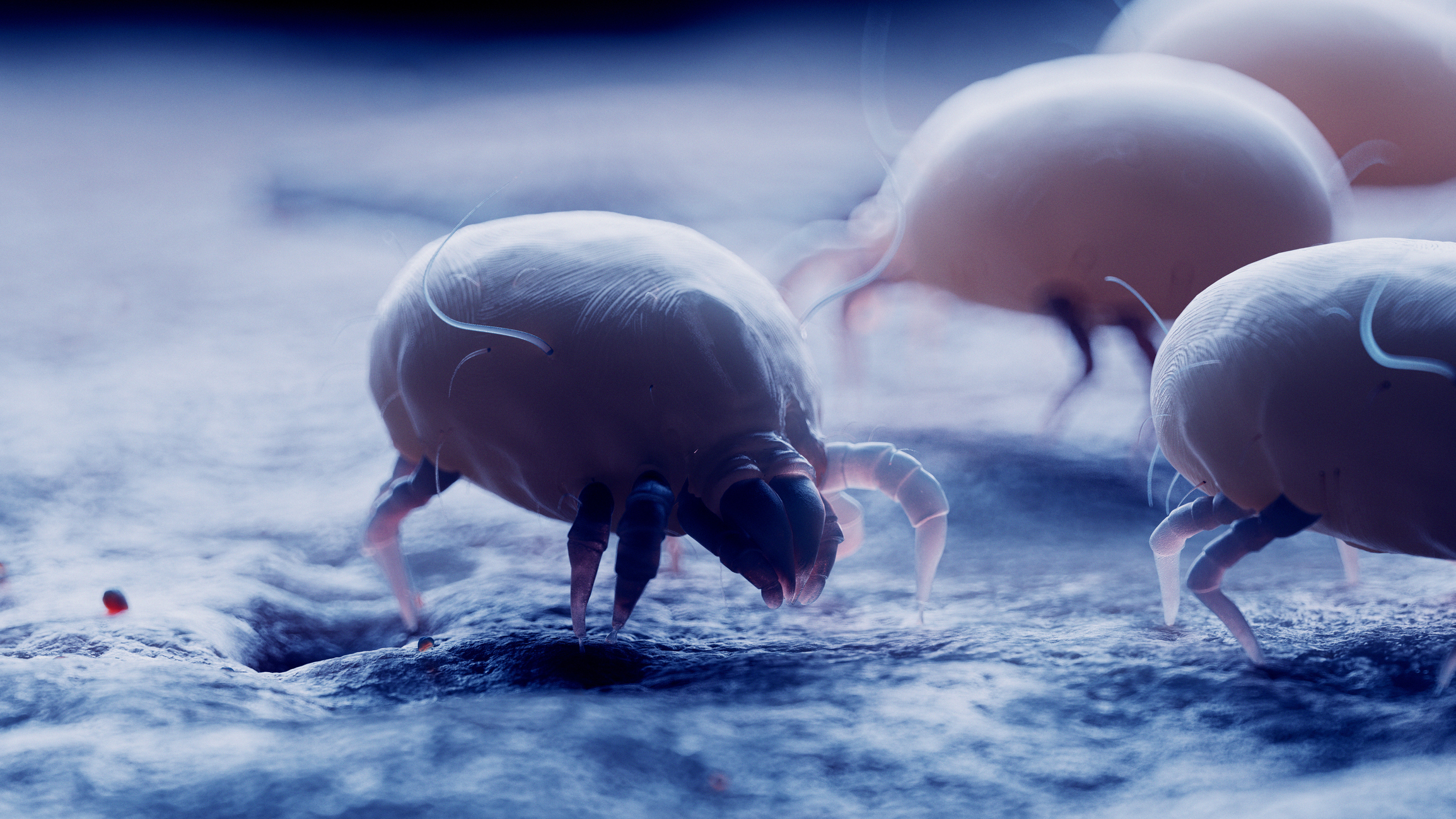
Before we delve into the signs that dust mites have made your mattress their home and are wreaking havoc on your sleep, let’s first take a closer look at what dust mites actually are.
Dust mites are microscopic pests from the arachnid family and are undetectable to the naked eye. Unlike bed bugs, which bite and draw blood for sustenance, dust mites absorb moisture from their surroundings and feed on dead, shed skin. That’s why mattresses make such an ideal environment for them to thrive, as it’s where sleeping humans create plenty of both.
Those with dust and dust mite allergies are actually allergic to the proteins created by dust mite waste and the decaying bodies of their dead. Is your mattress home to a horde of dust mites? Here’s how to tell…
7 signs that you have dust mites in your mattress
1. There are visible signs of dust
The presence of dust on or around your bed doesn’t automatically mean that dust mites are present in your mattress, but it’s a pretty strong indicator that they are. Without a regular mattress cleaning schedule, dust mites are free to feed and breed on the surface of your mattress and deep within, close to their food and water supply (us.)
Dust is the natural habitat for dust mites, so where you see dust, dust mites are likely to dwell. Even if you’re lucky enough not to experience the symptoms and sleep disruptions (below), it’s more than likely that dust mites are present.
2. Your nose is stuffy at night
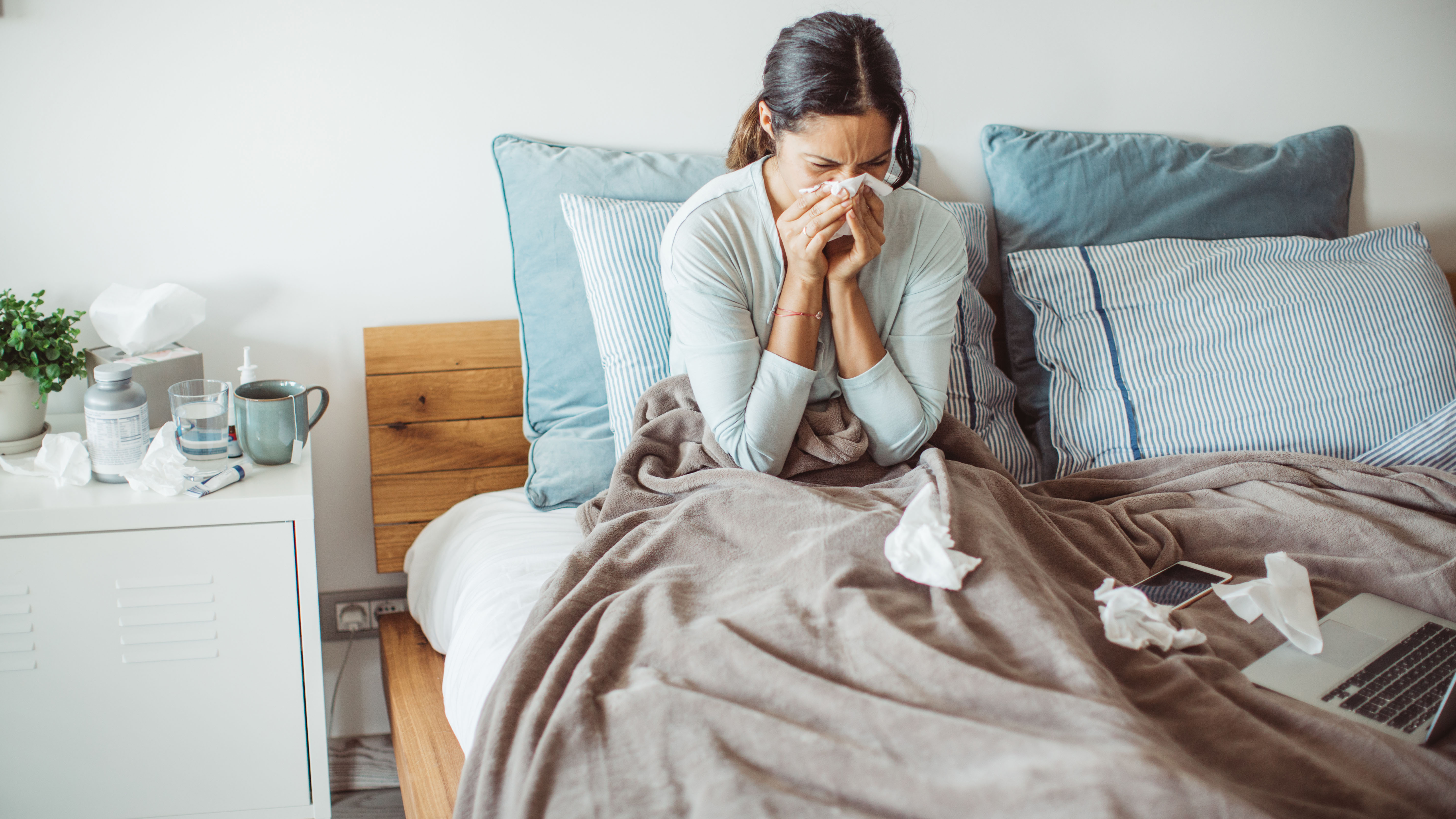
Dust mites can aggravate existing allergies, resulting in symptoms that closely resemble a common cold, such as a stuffy or running nose. This can make it difficult to fall and stay asleep, as well as causing snoring.
Pay attention to your symptoms — are they more pronounced during the night? If your breathing feels labored or your nose becomes congested as soon as you get into bed, it’s likely that allergens caused by dust mites are to blame.
3. Your bedroom is humid but your cough is dry
If your cough is dry but your bedroom feels humid, dust mites are the likely culprit. Dust mites absorb moisture through their environment, which is why they thrive in areas of high humidity.
We lose between 0.5 and 1 liter of moisture per night while we sleep, which is partly what attracts dust mites to us. If a sore throat and a dry, itchy cough is stopping you from sleeping but your bedroom is humid, it’s a strong indicator that a dust mite allergy is aggravating your airways.
4. Your skin is itchy
Skin reactions, including dry, itchy skin, is another sign that dust mites are dwelling within the soft comfort layers of your mattress. A reaction to a dust mite allergy might also trigger a flare up of an existing skin condition, such as eczema.
Hives and rashes are your skin’s way of telling you that they have come into contact with an irritant. If your dry and itchy skin is isolated, you could be allergenic to a different material within your mattress, such as latex. However, if itchy skin or hives are present in conjunction with any other symptoms mentioned above, dust mites could be to blame.
5. Bedtime makes you sneeze
A dust mite allergy resembles hay fever or a cold, so sneezing is common when dust mites are present — especially if your sneezing is more pronounced at night. Sleeping on a mattress infested with dust mites can stir up allergies and cause sneezing and runny noses, so don’t ignore those symptoms.
It can be difficult to differentiate between a common cold and a dust mite allergy, but if your cold-like symptoms persist after a week, it’s likely a dust mite allergy.
Get instant access to breaking news, the hottest reviews, great deals and helpful tips.
6. It's difficult to breathe at night
According to the American Lung Association, the presence of dust mites is one of the biggest indoor triggers for asthma, which can cause both mild and severe symptoms, including an asthma attack. This is because the allergens caused by dust mite waste can cause your chest to tighten, making it difficult to breathe during the night.
Difficulty breathing or wheezing should never be ignored, especially if you have an existing respiratory issue. Make sure to thoroughly vacuum your mattress and bedroom to remove the dust mites, their feces and any excess dust particles. If the issue persists, seek the advice of a doctor.
7. You have dry, itchy eyes
Unlike bed bugs or other pests, dust mites don't bite or sting. Instead, they make their presence known by causing flu-like symptoms which can cause your eyes to water and itch when coming into contact with them. If you often wake up with itchy eyes, a dust-mite infestation could be to blame.
How to get rid of dust mites from your mattress
Your mattress is an ideal environment for dust mites, who thrive in dark, humid environments where they can stay sustained on shed skin cells and trapped moisture. Thankfully, there’s plenty you can do to remove dust mites from your mattress…
Vacuum your mattress regularly
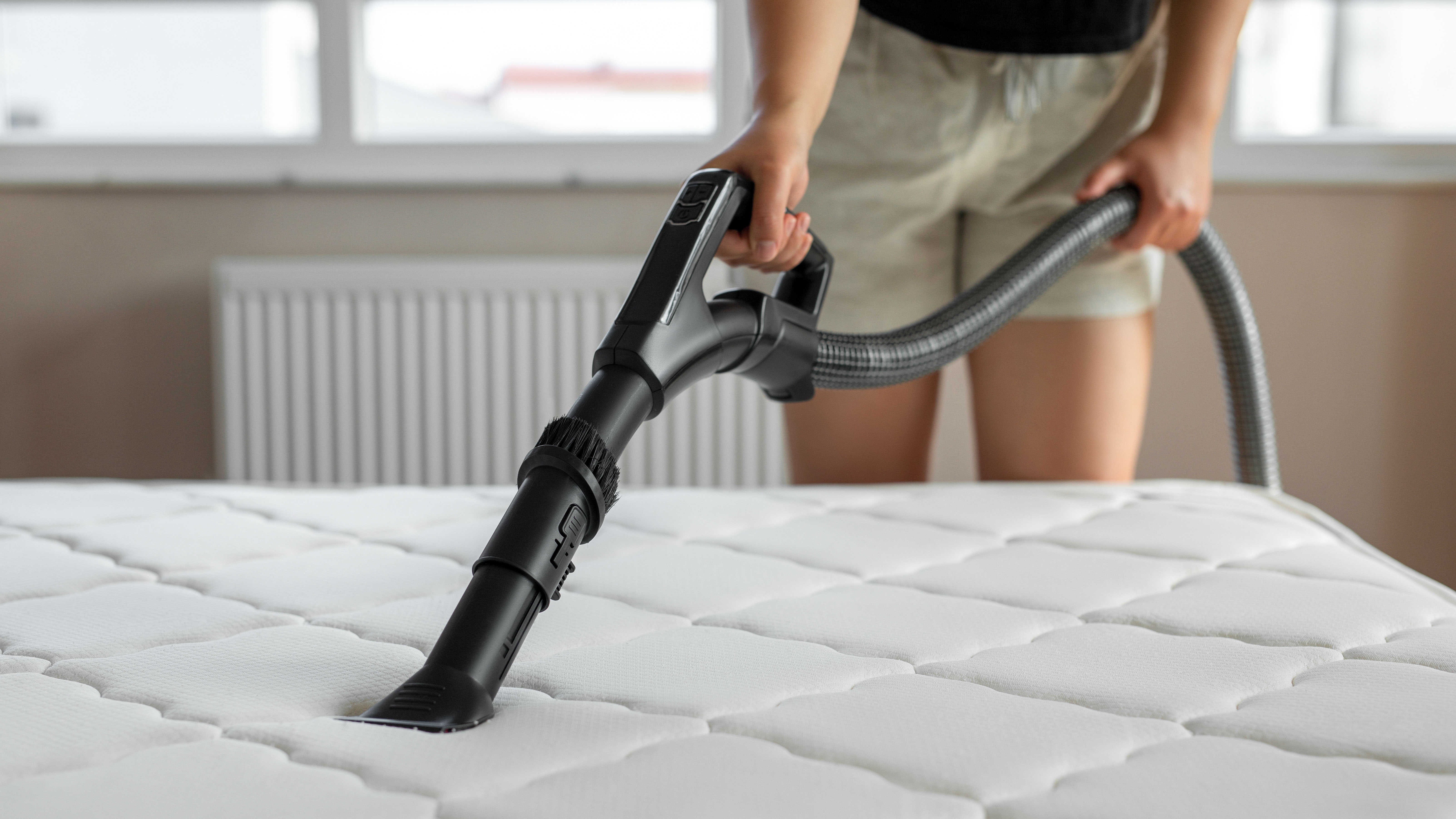
Vacuuming your mattress regularly is an excellent way to get rid of dust mites. After stripping your bed, run the upholstery attachment across the top and sides of your mattress, focusing your attention on any creases or seams.
If you are able, it’s also a good idea to lift the mattress and vacuum your bed foundation, where dust can collect and build. For those with a dust mite allergy, you might want to consider investing in a vacuum cleaner with a HEPA filter.
A HEPA filter helps trap and remove the smallest of airborne particles, including dust mites, their waste and eggs.
Hot wash your bedding
Another way to drastically reduce the number of dust mites dwelling in and around your bed is by laundering your bed sheets on a weekly basis. Check the manufacturer's care label before you do so, but cleaning your sheets on a wash of at least 120°F (54.4°C) helps kill dust mites and their eggs.
Dust mites love humidity, so make sure you dry your sheets (and the rest of your laundry, for that matter) outdoors to reduce humidity levels in your home.
Remove clutter from around your bed
Not only is removing the clutter from around your bed an excellent way to improve your sleep hygiene, decluttering your bedroom effectively reduces the areas where dust mites can accumulate.
Focus on the areas immediately next to your bed, such as any bedside tables. Next, turn your attention to thoroughly vacuuming any soft furnishings in the bedroom, including curtains, carpets or soft toys.
Steam clean your mattress
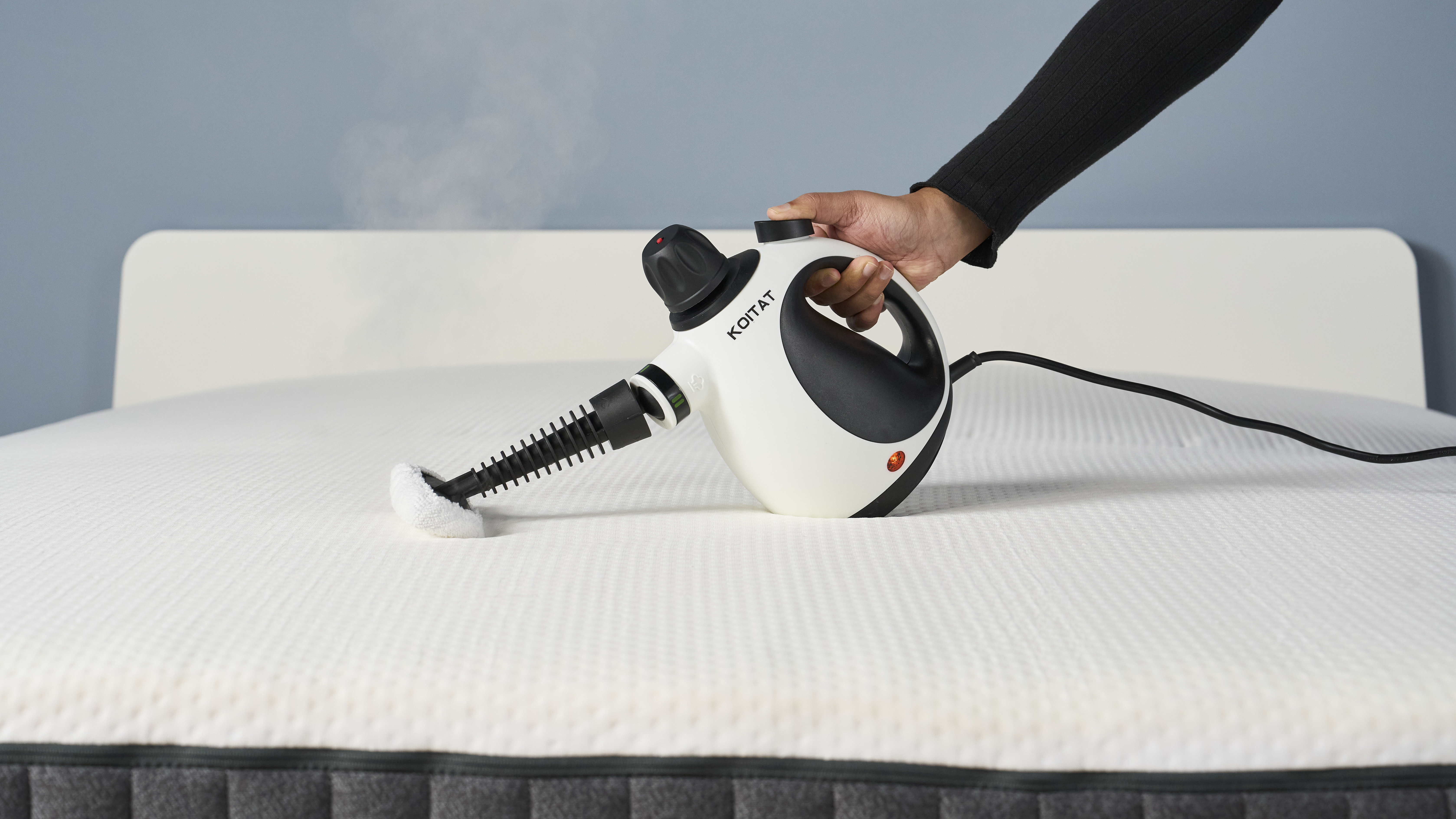
Vacuuming and cleaning your bed sheets helps keep dust mites numbers down, while steam cleaning your mattress kills dust mites on the spot. However, steam cleaners can reach temperatures as high as 212°F (100°C), so check the care label of your mattress before attempting this. Some mattress materials, including the best memory foam mattresses, can become damaged by extreme heat.
Remember, dust mites love humidity, so open your bedroom window wide to allow plenty of cool air into the room. As well as helping your mattress to dry following steam cleaning, airflow creates an inhospitable environment for dust mites.
Invest in a hypoallergenic mattress protector
Investing in one of the best mattress protectors will help protect your bed against dust mites. Hypoallergenic mattress protectors will be resistant to bacteria and allergens, as well as helping the top and side of your mattress remain dust mite free. However, for full protection, invest in a fully zippered mattress encasement to keep dust mites firmly locked out.
Depending on the type you buy and the level of protection it provides, a mattress protector will help prevent dust mites from invading the deep layers of your mattress. However, you will still need to regularly clean your mattress protector in order to stop dust mites from disrupting your sleep.

Nicola is the Sleep Editor at Tom’s Guide, where she helps steer the mattress and sleep content published on Tom’s Guide, including our Best Mattress for Back Pain buying guide. With a career in journalism spanning the best part of two decades, Nicola brings experience to the team and the knowledge of what makes a great article, whether that’s a how-to mattress cleaning feature, a deep dive into melatonin gummies, or an in-depth mattress review. As a sleep editor, few better understand how important a decent mattress is to the overall quality of our sleep, and precisely how our sleep impacts our physical and mental health. As well as tackling the vast topic of sleep, Nicola joins the raft of expert mattress specialists at Tom’s Guide, who test and compare a wide range of mattresses in order to guide readers towards the very best options on the market.
You must confirm your public display name before commenting
Please logout and then login again, you will then be prompted to enter your display name.
 Club Benefits
Club Benefits





